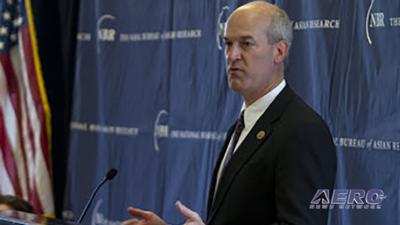Fri, Mar 17, 2017
Says 'Know Before You Fly' Act Would Protect Consumers
Rep. Rick Larsen (D-WA) has introduced the "Know Before You Fly Act" ... legislation he says is aimed at boosting consumer protections for air travelers.

Larsen (pictured), the ranking Democrat on the House Transportation Committee's Aviation Subcommittee, introduced H.R. 1420 with Rep. Peter DeFazio (D-OR) in a recent hearing of the subcommittee which featured Alaska Airlines CEO Brad Tilden as a key witness.
“Unexpected fees and lengthy delays are two surefire ways to ruin someone’s trip,” said Larsen. “By requiring airlines to be more transparent about baggage fees and how they will help passengers affected by large-scale network meltdowns, this bill would institute long-overdue consumer protections for folks who fly.”
Larsen says H.R. 1420 would direct more transparency from airlines in terms of what services will be provided to air travelers during mass flight delays and cancellations resulting from computer network failures, as well as require airlines to inform passengers about any baggage and ancillary fees at the front end of the transaction.
In 2015 and 2016, numerous U.S. airline computer network failures delayed or cancelled tens of thousands of flights, stranding millions of travelers at airports across the country. The Know Before You Fly Act will guarantee travelers affected by widespread network disruptions that delay or cancel flights know what relief – such as food, hotel vouchers, or seats on another airline – they can expect from airlines before purchasing a ticket.
U.S. airlines have surged to record profitability in recent years, bolstered in part by their assessment of ancillary charges. In 2015 alone, airlines collected $6.8 billion in bag fees and reservation change fees. The Trump administration has held up a Department of Transportation rulemaking that tightens requirements on airlines’ disclosure of ancillary fees. Larsen’s bill would codify the existing requirement that airlines and ticket agents must disclose and provide a list of checked and carry-on bag fees before customers purchase a ticket.
In addition, the bill directs the FAA to improve its process for collecting and analyzing reports of potentially hazardous fume events in airplane cabins.
(Source: Larsen news release. Image from file)
More News
Marker Beacon An electronic navigation facility transmitting a 75 MHz vertical fan or boneshaped radiation pattern. Marker beacons are identified by their modulation frequency and >[...]
“Aviation is an incredible tool for Samaritan’s Purse. After a disaster strikes, we want people to know why we are bringing life-saving supplies. We want them to know t>[...]
From 2024 (YouTube Edition): New Capabilities For Business Aviation CiES Corporation President Scott Philiben walked Aero-News Editor in Chief Jim Campbell through some of what set>[...]
Also: Duffy Predicts ‘Mass Chaos’, Modern Skies Coalition, More Impacts, Archer Buys Hawthorne With only a few months of preparation—and minimal outside media sup>[...]
The Experienced Pilot Chose To Operate In Instrument Meteorological Conditions Without An Instrument Flight Rules Clearance Analysis: The airplane was operated on a personal cross->[...]
 ANN's Daily Aero-Term (11.14.25): Marker Beacon
ANN's Daily Aero-Term (11.14.25): Marker Beacon Aero-News: Quote of the Day (11.14.25)
Aero-News: Quote of the Day (11.14.25) Classic Aero-TV: CiES All-Digital Fuel Senders
Classic Aero-TV: CiES All-Digital Fuel Senders Airborne 11.10.25: Affordable Expo Succeeds, Citation Ascend, Kenai Shuts Down
Airborne 11.10.25: Affordable Expo Succeeds, Citation Ascend, Kenai Shuts Down NTSB Final Report: Lancair 320
NTSB Final Report: Lancair 320



